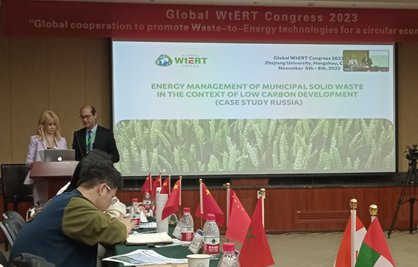RUDN ecologist Anna Kurbatova became the only speaker from Russia at the WtERT World Congress in China

Waste-to-energy facilities are increasingly important to improve energy efficiency and meet climate change goals. Over the past 15 years, China has made tremendous progress in phasing out waste disposal in landfills, with 648 plants thermally processing more than 804.67 thousand tons of waste per day.
“An important problem facing the humanity is how to reduce waste and conserve land resources. What to do with the waste that is already buried in huge quantities in the ground over vast territories, and which harms all components of the environment and humans? These questions were the main topics of discussion at the Congress,” Anna Kurbatova.
Over the past 10 years, China has achieved the complete closure of all landfills through the introduction of waste-to-energy incineration plants. Chinese technologies make it possible to burn even mixed waste with a high level of humidity, while achieving almost zero emissions of pollutants into the atmosphere. Russia’s policy in this area is separate waste collection and further material and energy recycling.
“I was not only the only speaker from RUDN University, but also from Russia. My report ‘Energy management of municipal solid waste in the context of low carbon development’ is dedicated to the development of a low-carbon economy in the field of waste management in Russia. In my speech, I addressed the following questions: what challenges are we facing? How can we reduce greenhouse gas emissions in waste management? Will the introduction of energy-based waste recycling help achieve targets for reducing the share of landfilled waste by 2030?
I cannot say whether the world will become a better place thanks to my research, but understanding the situation and the opportunity to apply Chinese experience in the field of energy recycling can certainly be expected in the future.
This is my third trip to China. Previously, I was there during the cooperation of BRICS universities, then at the invitation of the Chinese Ministry of Education. I was amazed by the transformation of the country that occurred during the pandemic. Clean cities, clean air, complete digitalization of all services. The Chinese have the whole world on their mobile phones. They have forgotten what cash and plastic cards are, using only QR codes. The people themselves are very hospitable and friendly, and there is mutual respect for each other.
At such international events I receive a lot of new information, and I am overwhelmed with the desire to tell students everything as soon as possible. Upon returning from the trip, I already gave a lecture ‘From waste to energy’ for the participants of the USCO winter school.
And, of course, the Congress is an opportunity to establish contacts with leading scientists and industrial partners for joint scientific research,” Anna Kurbatova.
In 2024, RUDN started accepting applications for the new annual Prize for Scientific Achievement in Chemistry. The award was established to honour contributions to fundamental and applied research, as well as merit in achieving the UN Sustainable Development Goals.
We continue to share the stories of front-line soldiers who created the Peoples’ Friendship University. Georgy Bruchinsky was born in 1917, graduated from the Leningrad Forestry Academy in 1939, and in 1941 graduated from the basic faculty of the Ivanovo Military Political School.
On the eve of Victory Day, we share the stories of front-line soldiers who, after the Great Patriotic War, participated in the creation of the Peoples' Friendship University and educated a new generation of students.
In 2024, RUDN started accepting applications for the new annual Prize for Scientific Achievement in Chemistry. The award was established to honour contributions to fundamental and applied research, as well as merit in achieving the UN Sustainable Development Goals.
We continue to share the stories of front-line soldiers who created the Peoples’ Friendship University. Georgy Bruchinsky was born in 1917, graduated from the Leningrad Forestry Academy in 1939, and in 1941 graduated from the basic faculty of the Ivanovo Military Political School.
On the eve of Victory Day, we share the stories of front-line soldiers who, after the Great Patriotic War, participated in the creation of the Peoples' Friendship University and educated a new generation of students.